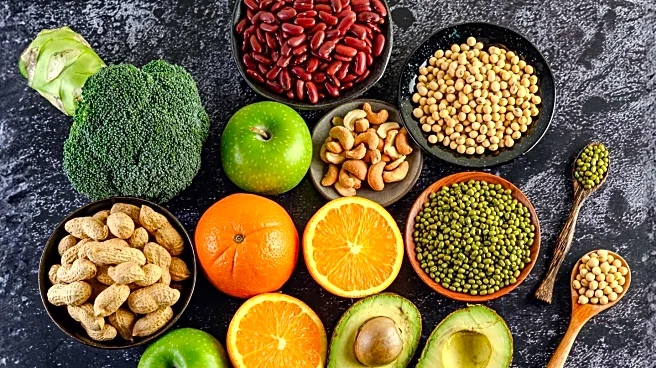What is the story about?
What's Happening?
Fiber is gaining recognition for its significant health benefits, including promoting digestive regularity and supporting the gut microbiome. Registered dietitians emphasize the importance of fiber as a prebiotic that nourishes beneficial gut bacteria, which is crucial for maintaining a healthy gut microbiome. This microbial community in the large intestine plays a vital role in immune, brain, and digestive health. Additionally, fiber aids in regulating serum cholesterol levels, contributing to chronic disease management and reducing the risk of type 2 diabetes, heart disease, and certain cancers. Despite these benefits, many Americans struggle to meet the recommended daily fiber intake, which is 25 grams for women and 38 grams for men. To address this, dietitians suggest incorporating fiber-rich foods such as whole grains, nuts, seeds, fruits, vegetables, and legumes into daily meals.
Why It's Important?
The emphasis on fiber-rich diets is crucial for public health, as it addresses common dietary deficiencies that can lead to chronic illnesses. By promoting fiber intake, dietitians aim to improve metabolic health and reduce the prevalence of conditions like diabetes and heart disease. This focus on fiber also supports the growing interest in gut health, which is linked to various aspects of overall well-being, including immune function and mental health. As more individuals become aware of the benefits of fiber, there is potential for a shift in dietary habits that prioritize plant-based foods, which are naturally high in fiber. This could lead to broader changes in food industry practices, encouraging the production and marketing of fiber-rich products.
What's Next?
As awareness of fiber's benefits continues to grow, it is likely that more educational initiatives and public health campaigns will emerge to promote fiber consumption. The food industry may respond by developing new products that cater to this demand, potentially leading to an increase in fiber-rich options available in supermarkets. Additionally, healthcare providers might incorporate fiber education into routine dietary counseling, emphasizing its role in disease prevention and overall health maintenance. Consumers may also seek out recipes and meal plans that help them integrate more fiber into their diets, contributing to a gradual shift towards healthier eating patterns.
Beyond the Headlines
The focus on fiber highlights broader trends in nutrition that prioritize whole foods and plant-based diets. This shift reflects a growing awareness of the environmental and ethical implications of food choices, as plant-based diets are often more sustainable and have a lower environmental impact than diets high in animal products. Furthermore, the emphasis on gut health underscores the interconnectedness of diet and mental health, as emerging research suggests that gut microbiome health can influence mood and cognitive function. These developments may lead to increased interest in personalized nutrition, where dietary recommendations are tailored to individual health needs and lifestyle factors.















